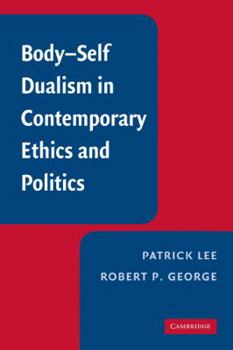Body-Self Dualism in Contemporary Ethics and Politics
Select Format
Select Condition 
Book Overview
Profoundly important ethical and political controversies turn on the question of whether biological life is an essential aspect of a human person, or only an extrinsic instrument. Lee and George argue that human beings are physical, animal organisms - albeit essentially rational and free - and examine the implications of this understanding of human beings for some of the most controversial issues in contemporary ethics and politics. The authors argue...
Format:Paperback
Language:English
ISBN:0521124190
ISBN13:9780521124195
Release Date:September 2009
Publisher:Cambridge University Press
Length:234 Pages
Weight:0.05 lbs.
Dimensions:0.6" x 6.0" x 8.9"
Customer Reviews
1 rating
An Outstanding Philosophical Critique of Dualism
Published by Thriftbooks.com User , 16 years ago
Lee and George have set forth a sophisticated refutation of the philosophical idea called "body-self dualism". At the heart of this philosophy is the view that humans persons are not deserving of moral respect in virtue of being whole, living, bodily human organisms, but in virtue of some quality which they develop over time, usually consciousness. It follows that human persons are something other than their bodies (not more than their bodies, but other than their bodies), that consciousness is personal but living bodies without consciousness are subpersonal. It further follows that those who are not yet conscious (e.g., embryos and fetuses), and those who have irretrievably lost consciousness (e.g., those in irreversible commas) are not persons and therefore may be treated instrumentally and even killed for the good of others. This reasoning underlies justifications for euthanasia, abortion and embryo destructive experimentation. Lee and George set forth a basic argument in defense of the view that bodily (biological) life is an essential and intrinsic aspect of persons. They entertain extensive objections against this view. And then they put the view to work in relation to several contemporary controversial moral issues: hedonism and hedonistic drug taking, abortion, euthanasia and issues in sexual ethics. The basic argument goes like this: sensation is a bodily act of a living being; therefore the agent that senses is a bodily entity, an animal; but in humans, the agent who senses also reasons and has self-awareness; therefore the agent who reasons and has self-awareness is a bodily entity, not a spiritual entity making use of the body as an extrinsic instrument. Having established the animality of human beings, Lee and George in chapter two argue that human are nevertheless unique kinds of animals, animals with a radical difference from all other bodily beings, which requires that they be treated radically different from the way all other animals are treated. They argue, in other words, that the animal organism that constitutes the human being is a "person". And that the personhood claim is fully compatible with the animalist claim. This of course takes careful argument, which Lee and George execute masterfully. Their `human organisms are human persons' argument has obvious and profound implications. For example, in chapter four it is used to address the issue of abortion. It leads to the conclusion that human embryos and fetuses are complete, though immature, human beings. But since human beings are human persons, embryos and fetuses are human persons. Since humans are deserving of full moral respect in virtue of being persons (i.e., in virtue of that which separates them from other animals), embryos and fetuses are deserving of full moral respect. Similarly, in chapter five, treating euthanasia, they argue that since human beings remain persons throughout their entire duration as animal organisms (





